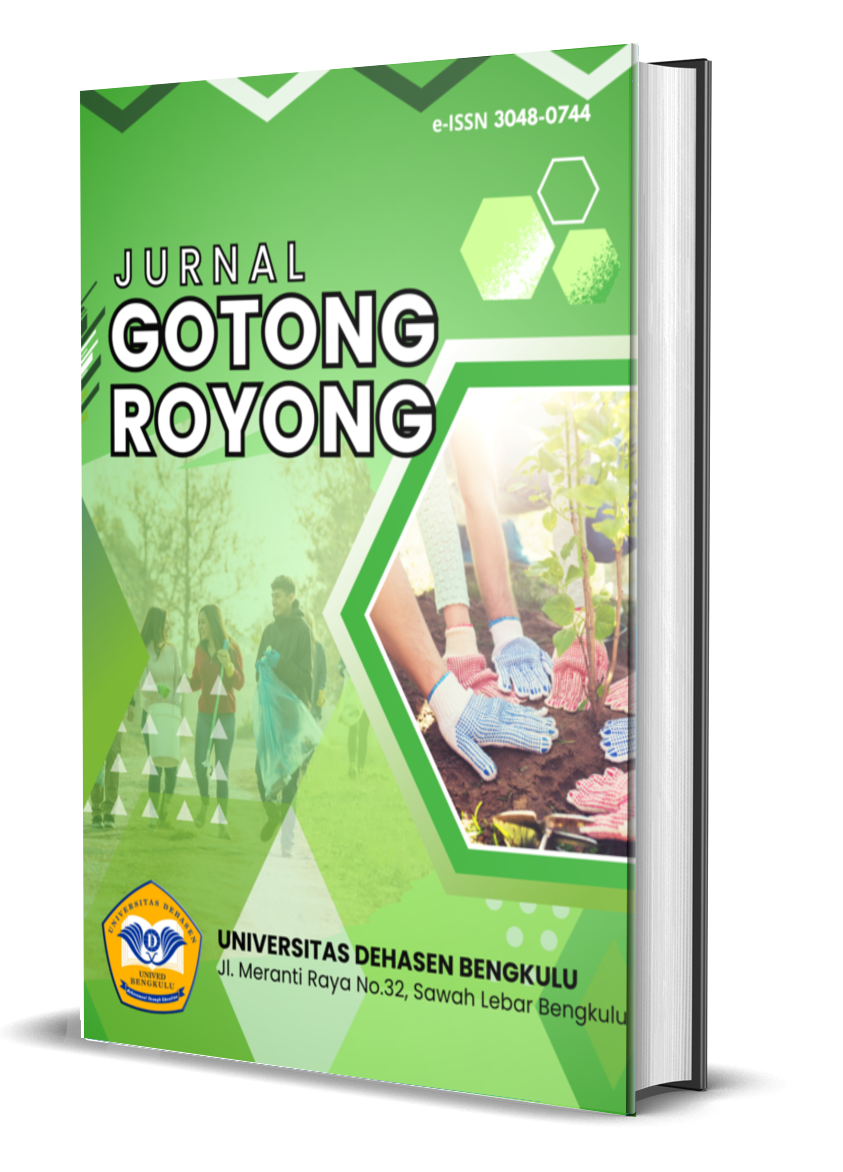Pelatihan Pengolahan Limbah Plastik Warga Rt 02 Pematang Gubernur
Abstract
The continuous increase in plastic waste has become a serious problem in Indonesia, particularly in the RT 02 Pematang Governor area. The lack of awareness and skills among the community in managing inorganic waste, such as plastic bottle caps, has led to the accumulation of garbage and has a negative impact on the environment. This article aims to describe the implementation of a plastic waste processing training program as a solution to the aforementioned problem. The methods used include three stages: preparation of tools and materials, implementation of training in making handicraft products (such as trash bins, pencil cases, and bags of bottle caps), and evaluation and documentation of activities. The training was conducted demonstratively and participatively for the residents of RT 02. The results of the activity show an increase in residents' knowledge, creativity, and skills in recycling waste into valuable and economically useful products. This activity also promotes environmental awareness and the economic independence of the community. In conclusion, creativity-based plastic waste processing training has proven effective as a strategy for implementing a circular economy and sustainable environmental preservation.
Downloads
References
2. Fajar, R., Susilo, N., Darmawan, A. J., & Putri, Y. H. (2023). Konsep Ekonomi Sirkular Dalam Model Bisnis Berkelanjutan Untuk Membangun Gaya Hidup Hijau Masyarakat Indonesia. Jurnal IMAGINE, 3(1), 2776–9836. https://jurnal.std-bali.ac.id/index.php/imagine
3. Kusumawardani, N., Meidasari, E., & Sukmasari, D. (2023). Peningkatan Kompetensi Wirausaha Ekonomi Kreatif Bagi Siswa Kejuruan Melalui Produk Kerajinan Tangan. Jurnal Masyarakat Madani Indonesia, 2(4), 478–482. https://doi.org/10.59025/js.v2i4.166
4. L.P, N., Sari, I., Zahra, A., Puspa, K. M., Dedi, A. M., Sari, F., & Ahmad Dahlan, J. K. (2024). Kreativitas Dalam Mengelolah Sampah Plastik. Prosiding Seminar Nasional LPPM UMJ, November, 1–4. http://jurnal.umj.ac.id/index.php/semnaskat
5. Marfufah, M. R., Ngazizah, N., Keguruan, F., & Purworejo, U. M. (2024). Proyek STEAM Pemanfaatan Limbah Tutup Botol Plastik Menjadi Kerajinan Vas Bunga. Jurnal Pendidikan Dasar, 5(2), 54–62.
6. Murdaningsih, M., Peni, N., Tupen, S. N., Aje, A. U., & Tute, K. J. (2022). Pelatihan Pemanfaatan Sampah Anorganik Menjadi Berbagai Tas Bagi Masyarakat Kelurahan Kota Raja Kecamatan Ende Utara Pada Masa Pandemi Covid-19. SELAPARANG: Jurnal Pengabdian Masyarakat Berkemajuan, 6(1), 134. https://doi.org/10.31764/jpmb.v6i1.6960
7. Nur, A., Resky Ananda, D., Tiara, C. A., Saputri, Y. S., & Adhim, F. (2024). Pemanfaatan Limbah Tutup Botol Plastik Menjadi Kerajinan Tangan Yang Memiliki Nilai Jual. Jurnal Ilmiah Multidisiplin Terpadu, 8(7), 2246–6111.
8. Rizki, P. A., Yushardi, Y., & Sudartik, S. (2023). Daur Ulang Sampah Menjadi Barang Yang Bernilai Ekonomis Di Kalangan Masyarakat. Jurnal Sains Riset, 13(1), 83–87. https://doi.org/10.47647/jsr.v13i1.889
9. Rukiah, Y., Saptodewo, F., & Andrijanto, M. S. (2020). Penciptaan Produk Kreatif dari Tutup Botol Minuman Kemasan Plastik. … : Semangat Nasional Dalam …, 1(1), 1–12. https://jurnalbima.id/index.php/senada/article/view/2%0Ahttps://jurnalbima.id/index.php/senada/article/download/2/1
10. Zuraidah, Z., Rosyidah, L. N., & Zulfi, R. F. (2022). Edukasi Pengelolaan Dan Pemanfaatan Sampah Anorganik Di Mi Al Munir Desa Gadungan Kecamatan Puncu Kabupaten Kediri. Budimas : Jurnal Pengabdian Masyarakat, 4(2), 1–6. https://doi.org/10.29040/budimas.v4i2.654
Copyright (c) 2025 Zelinda Prasetia, Singgi Mulyadi, Wiranda Buaton, Nita Meliani, Alwin Danofi, Eska Prima Monique Damarsiwi, Neri Susanti, Yun Fitriano

This work is licensed under a Creative Commons Attribution-ShareAlike 4.0 International License.
An author who publishes in the Jurnal Gotong Royong agrees to the following terms:
Author retains the copyright and grants the journal the right of first publication of the work simultaneously licensed under the Creative Commons Attribution-ShareAlike 4.0 License that allows others to share the work with an acknowledgement of the work's authorship and initial publication in this journal
Submission of a manuscript implies that the submitted work has not been published before (except as part of a thesis or report, or abstract); that it is not under consideration for publication elsewhere; that its publication has been approved by all co-authors. If and when the manuscript is accepted for publication, the author(s) still hold the copyright and retain publishing rights without restrictions. For the new invention, authors are suggested to manage its patent before published. The license type is CC-BY-SA 4.0.
Jurnal Gotong Royong
is licensed under a Creative Commons Attribution-ShareAlike 4.0 International License.










